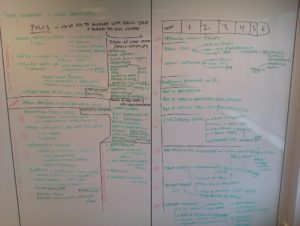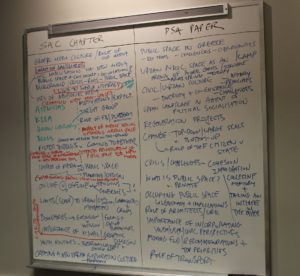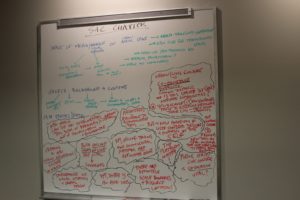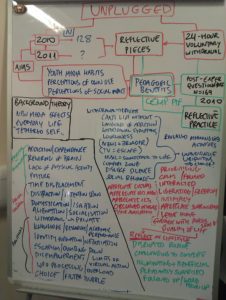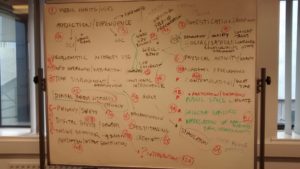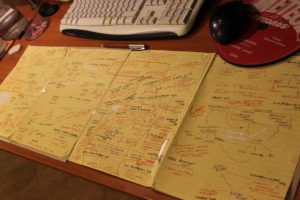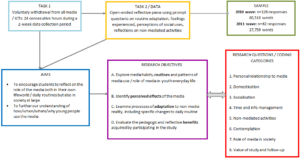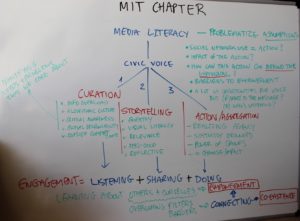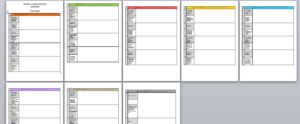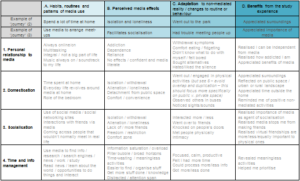Public Space & Urban Coexistence This project brings together urban, civic and media studies so as to develop applied and innovative ways of evaluating the potential of public space to facilitate urban coexistence and community resilience, and identifying practical ways that civic media, architecture, design and the arts can help nurture the civic culture and counter extremism and segregation. Data: interviews with architects, urban planning experts and community organizers; case studies of Athens and Boston; appraisal of community activities and public spaces; visual ethnography across tens of cities in Europe and the United States. Outputs: Forthcoming paper on the civic potential of urban landscapes Forthcoming paper on the politics of public space in Athens, Greece Book chapter – Gerodimos R. (2014), “Reclaiming the Urban Landscape, Rebuilding the Civic Culture: Online Mobilization, Community Building, and Public Space in Athens, Greece” in M. Shumow (ed), Mediated Communities: Civic Voices, Empowerment and Belonging In the Digital Era, New York, NY: Peter Lang Photo journal – The Boston Diaries (October 2013 – January 2014) Online exhibits – Urban Landscapes (2011 – ) Short film – At the Edge of the Present (2015) Brainstorming: Youth, Media and the City This project combines youth, urban and media studies so as to explore young people’s patterns of media use, and the potential of innovative approaches (such as digital literacy and participatory photography) as tools of urban engagement and civic voice. Data: interviews with architects, urban planning experts and community organizers; media experiment and reflective diaries (n=190 students); participatory/reflective photography study (n=51 students); surveys; case studies of students at Emerson College, Boston, and Bournemouth University; visual ethnography across tens of cities in Europe and the United States; pilots and prototyping at the Salzburg Academy on Media & Global Change and at the Engagement Lab in Boston. Outputs: Paper – Gerodimos, R. (2017, forthcoming), “Youth and the City: Reflective Photography as a Tool of Urban Voice”, Journal of Media Literacy Education, 9: 3 Book chapter – Gerodimos R. (2017), “From “being tethered” to “going unplugged”: media addiction and the role of unplugging as a transformative tool of digital literacy” in B. De Abreu, P. Mihailidis, A. Lee, J. Melki and J. McDougall (eds), International Handbook of Media Literacy Education, London: Routledge, pp. 337-353 Book chapter – Mihailidis P. and R. Gerodimos (2016), “Connecting Pedagogies of Civic Media: The literacies, Connected Civics, and engagement in daily life” in E. Gordon and P. Mihailidis (eds), Civic Media: Technology, Design, Practice, Cambridge, MA: MIT Press Short film – A Certain Type of Freedom (2015) Presentation of interim findings at OfCom research seminar (June 2011) Website – The World Unplugged (2011) Media coverage – BBC News (2010), BBC Online (2010), The Independent (2010), Sunday Telegraph (2011), Die Zeit (2011), ZDF (2011) Brainstorming: Coding Sheets for Unplugged study – click on the images to download the Word docs Coding Sheet for Youth & the City study – click on the image to download the PDF Global Citizenship, Global Governance and Global Current Affairs This project examines the challenges facing democracy in the 21st century due to globalization. It considers emerging forms of global citizenship and global governance, the impact of digital media on diplomacy and civic engagement with global affairs, as well as key current affairs, such as the New Cold War between Russia and the West and their impact on the stability of the international system. Data: elite interviews (diplomats, senior executives of international fora, experts); large crossnational survey; case studies. Outputs: Forthcoming paper on the findings of the Global Citizenship Survey Forthcoming paper on global governance & the agenda of the 21st century Report – Russia is Attacking Western Liberal Democracies: Extensive evidence of cyber attacks and strategic interference in domestic politics Book Chapter – Gerodimos R. (2018, forthcoming), “Global Citizenship” in R. Hobbs and P. Mihailidis (eds), The International Encyclopedia of Media Literacy, Oxford: Wiley-Blackwell Special Broadcast – Media, Migration & Empathy: Innovation & Engagement, Media for Change Global Conference / School of Journalism, Bournemouth University, 17/11/2016 Video – Onward Movements: Refugee and migrant flows across Europe (2016) Book Chapter – Gerodimos R. (2013), “Introducing ‘Citizen Diplomacy 2.0’: A Framework for the Study of Online Civic Engagement with Global Affairs” in R. Scullion, R. Gerodimos, D. Jackson and D. Lilleker (eds), The Media, Political Participation and Empowerment, London: Routledge Book Chapter – Gerodimos R. (2013), “Global News, Global Challenges” in S. Allan and K. Fowler-Watt (eds), Journalism: New Challenges, Bournemouth University: Centre for Communication & Journalism Research Paper – Gerodimos, R. (2012), “Journalism Students as Global Citizens and Mediators: Incorporating Global Current Affairs into the Journalism Curriculum”, Journalism Education, 1: 1, pp. 70-86 Civic Mobilisation on Instagram during the 2014 Romanian Election
Algorithmic Personalization as a Digital Literacy Emergency The use of highly complex and quite unobtrusive algorithms for the personalization of web content has become widespread over the last decade. All major providers – search engines, social media, news organisations, advertisers and even political campaigns – are continuously developing their algorithms so as to offer users content that is as close to their interests and profiles as possible. Personalization algorithms constitute the internet’s ‘black box’: they collate information about a user’s background, online behaviour, location and preferences and shape that user’s online experience in response to that information, while remaining unseen. The significant implications and potential dangers of personalization – the danger of what Eli Pariser described as the ‘filter bubble’ – have only recently started to appear in the scholarly literature (Bucher 2012, 2016; Hallinan and Striphas 2014; Hermans and Vergeer 2013; Kitchin 2016). Content providers are reluctant to disclose details about their algorithmic tools and few users appear to be aware of their existence. This paper reviews existing research on this issue, reports on the findings of a preliminary study amongst students and considers possible methodological approaches. I argue that algorithmic personalization should be addressed as a digital media literacy imperative and as an urgent challenge. While algorithms filter and screen out viewpoints, ideas and people whom we wouldn’t normally choose to encounter (a potentially problematic phenomenon in itself), it is the hidden nature of this practice that is particularly offensive to the idea of the internet as a public sphere and of users as free citizens and literate consumers. More materials available soon Visual Research Methods This project is an effort to map the literature on, and uses of, visual research and data analysis, including visual ethnography, participatory photography / photovoice, photo elicitation. The project runs alongside and draws from / feeds into almost all my other research projects, which involve some form of use or analysis of visual data. Coding books/sheets and analysis techniques developed over the last few years can be found above/below. More materials will be added soon. The Crisis in Greece - Populism and Extreme Austerity Paper – Gerodimos, R. (2015), “The Ideology of Far-Left Populism in Greece: Blame, Victimhood and Revenge in the Discourse of Greek Anarchists”, Political Studies, 63: 3, pp. 608-625 Book – Karyotis, G. and Gerodimos, R. (eds) (2015), The Politics of Extreme Austerity: Greece in the Eurozone Crisis, Basingstoke: Palgrave Book Chapter – Gerodimos R. and G. Karyotis (2015), “Austerity Politics and Crisis Governance: Lessons from Greece” in G. Karyotis and R. Gerodimos (eds), The Politics of Extreme Austerity: Greece in the Eurozone Crisis, Basingstoke: Palgrave GPSG Election Pamphlets – May 2012, June 2012, May 2014, January 2015, September 2015 Article – Gerodimos, R. (2015), “Greece’s Ongoing Tragedy”, Political Insight, 6: 3 Article – Gerodimos, R. (2013) “Greece: Politics at the Crossroads”, Political Insight, 4: 1 International Conference – GPSG Workshop on Political Violence, Terrorism & Extremism in Greece & Europe, Canada Water Library, London (2014) International Conference – The Politics of Extreme Austerity, University of Strathclyde, Glasgow (2011) Selected Media Appearances: BBC News (2012), CNN (2012), BBC Radio 5 Live (2012), USA Today (2012), Euronews (2014), Radio France Internationale (2015), International Business Times (2015), LBC Radio (2015), Sky News (2015), Los Angeles Times (2015), SABC (2015) Scenario Analysis on the Greek Referendum – 01/07/2015 – 05/07/2015, PSA Blog Coding Sheet for Populism Study (click on the image to download the PDF): Coding & Analysis Political Communication on Facebook: The 2012 Obama Campaign This project examines the role of social media in contemporary political communication, focusing on Barack Obama’s Facebook campaign in the run-up to the 2012 presidential election. We use Facebook’s native interactive features (like, comment, and share) as indicators of how citizens engage with particular political messages and consider their role as tools of political voice. Data: content and statistical analysis of the Obama campaign’s Facebook posts over a two-month period ending on Election Day (N=163) Outputs: Paper – Gerodimos, R. and Justinussen, J. (2015), “Obama’s 2012 Facebook Campaign: Political Communication in the Age of the Like Button”, Journal of Information Technology & Politics, 12: 2, pp. 113-132 Video – Political Communication in the Age of the Like Button (2015)
Brainstorming: Coding & Analysis: Youth Civic Engagement: Digital Media, Issue Politics, Civic Consumerism Opening Keynote, 14 September 2015, at the European Commission / Council of Europe Symposium on Youth Participation in a Digitalised World, European Youth Centre Budapest, Hungary Book Review – Gerodimos, R (2014), The Civic Web: Young People, the Internet, and Civic Participation, by Shakuntala Banaji and David Buckingham. Reviewed in: European Journal of Communication, 29:6, 755-7 Book – Scullion, R., Gerodimos, R., Jackson, D. and Lilleker, D. (eds), (2013), The Media, Political Participation and Empowerment, London: Routledge Paper – Gerodimos, R. (2012), “Online Youth Civic Attitudes and the Limits of Civic Consumerism: the Emerging Challenge to the Internet’s Democratic Potential”, Information, Communication & Society, 15: 2, pp. 217-245 Book Chapter – Gerodimos R. (2012), “Online Youth Civic Attitudes and the Limits of Civic Consumerism” in B. Loader and D. Mercea (eds), Social Media and Democracy: Innovations in Participatory Politics, London: Routledge Paper – Gerodimos, R. (2008), “Mobilising Young Citizens in the UK: a content analysis of youth and issue websites”, Information, Communication & Society, 11: 7, pp. 964-988 Book Chapter – Gerodimos, R. and J. Ward (2007), “Rethinking Online Youth Civic Engagement: Reflections on Web Content Analysis” in B. Loader (ed), Young Citizens in the Digital Age: Political Engagement, Young People and New Media, London: Routledge Paper – Gerodimos, R. (2006), “Democracy and the Internet: Access, Engagement and Deliberation”, Journal of Systemics, Cybernetics and Informatics, 3: 6, pp. 26-31 PhD Thesis (2010), New Media, New Citizens: the Terms & Conditions of Online Youth Civic Engagement Data: expert review and web content analysis of 20 NGO/youth websites; focus groups, user testing and survey with young users of NGO websites; hyperlink network analysis of civic issue clusters; survey on youth civic and online attitudes; ethnographic study (observation, interview and survey of activists) of local community meeting Coding sheet for web content analysis (click on the image to download PDF): Analysis samples: 
Original version (Medium)
Revised and expanded version (NYU Jordan Center All the Russias’ blog)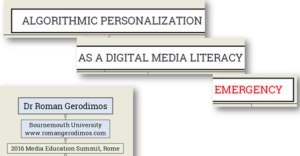
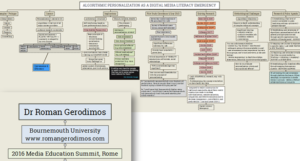
Previous Projects


